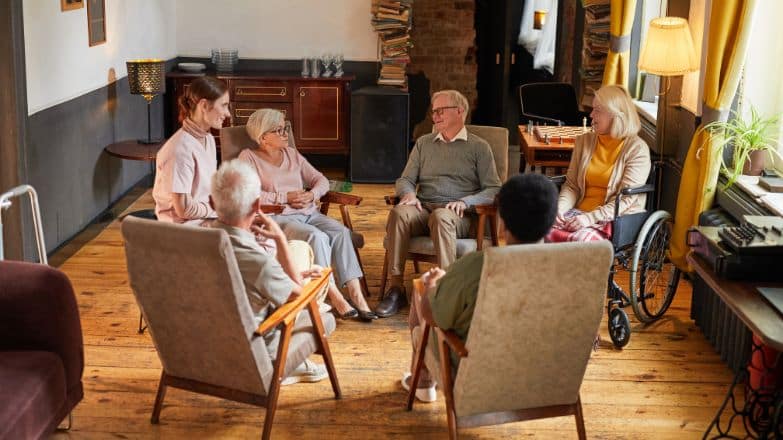California currently boasts 8100 licensed nursing and care homes for elderly individuals. Residential care describes a system that includes care without medical treatment and provides a service in one family home / retirement residence or other suitable care facility such as a nursing home. Most residential care facilities in America have attained at least 99% residential residents living in private home settings or single-family residences with fewer residents. The same residential care facility is often deemed a senior living center.
Licensing Regulations for Residential Care Facilities
Residential care services are managed by Community Services Licence - a sub agency within California's Social Services Department. In the early 1970s, residential care was conceived in California for supplying services for the elderly, developmentally unable, mental disorders and children with the Department of Public Social Services.
In the early 20th century elderly care houses had the title Board and care homes and the name remains commonly associated as a word describing residential health care and homes.
Differences Between a Residential Care Facility and an Assisted Living Community
When considering the differences between residential care facilities and assisted living communities, it is important to grasp the nuances that set them apart. Residential care facilities, also known as nursing homes or skilled nursing facilities, cater primarily to individuals with significant medical needs who require round-the-clock supervision and assistance with daily activities.
These facilities provide 24/7 nursing care from licensed healthcare professionals and typically offer a higher staff-to-resident ratio than other types of senior living options. With an emphasis on maintaining health and managing chronic medical conditions, residential care facilities have robust clinical capabilities to handle complex medical cases.
On the other hand, assisted living communities focus more on promoting independence while providing personalized support for seniors who may need help with certain aspects of their day-to-day lives. Assisted living combines housing accommodations with supportive services such as medication management, meal preparation, laundry assistance, transportation arrangements, housekeeping services, and personal care assistance if required.
While they do not typically have full-time nurses on-site like residential care facilities do, many assisted living communities employ trained nursing staff who can respond to emergencies or aid residents in case of medical concerns.
An assisted living community often boast a wide range of social activities human services and amenities tailored towards fostering an active lifestyle amongst its residents. These include fitness centers or classes for physical wellness; communal dining areas for shared meals; recreational spaces for hobbies like gardening or crafts; organized outings for entertainment; regular social events promoting interaction among peers; beauty salons/barbershops offering grooming services—all aimed at enhancing social engagement within an assisted living community or facilities for the elderly.

Residential Care Homes Services and Amenities
A residential care home is an ideal option for senior citizens that are in need of support for daily living activities but do not require any medical care. The services and amenities offered at care homes provide the residents with the freedom to maintain independence and privacy as they wish.
Services provided by care homes can differ in their scope and quality but some of the more commonly following services found are: Due to state regulations as to size of small private facilities and similar appearance to single families care homes often lack additional facilities. Often care homes will have fenced-off grounds where residents may be allowed outdoor recreation or socializing with neighbors, while others have fewer restrictions.
Community Size
An Assisted Living Center can generally be compared to a residential facility. Residents of a nursing home usually reside in a private or semiprivate room with a bath. Compared to assisted living communities, residents live within the home and can choose from floor plans which usually contain studio, 1-room and 2-bedroom options.
Our assisted living communities offer plenty of shared room including cosy living areas and shared rooms as well as community resources such fewer amenities such as libraries, cafes and computer rooms, which can sometimes be unavailable in more compact residential settings.
What Are Memory Care Communities?
Memory care communities are specialized residential settings that provide comprehensive care and support to individuals suffering from memory-related disorders, such as Alzheimer's disease or dementia. Designed with the goal of facilitating a safe and comfortable environment, these communities offer unique features geared towards meeting the specific needs of residents experiencing memory loss.
Unlike traditional assisted living facilities or skilled nursing care centers, memory care communities employ trained professionals who possess an in-depth understanding of memory disorders and utilize evidence-based approaches to enhance residents' quality of life. The staff members are specifically educated in managing challenging behaviors associated with cognitive decline while promoting independence within a secure setting.
These communities prioritize person-centered care by tailoring activities and individualized programming to individuals based on their personal history, preferences, abilities, and cognitive functioning levels. By providing around-the-clock supervision along with assistance with daily tasks like bathing, dressing and medication management, memory care communities ensure residents receive holistic attention in all aspects of their lives.
Additionally, many facilities incorporate therapeutic methods such as music therapy, art therapy, and reminiscence therapy into their programs to stimulate cognition and foster emotional well-being among residents.
In short, living within a memory care community offers carefully curated experiences aimed at maintaining dignity while effectively addressing the challenges faced by those struggling with degenerative conditions as compared to other options like assisted living facility or skilled nursing home settings.
Develop your skills and knowledge in support work for older people. Community Care Toolkit provides an online learning experience that helps you develop your skills and learn new ones.
How Residential Care Homes Compare to Other Senior Living Options
Residential care homes, also known as residential care facilities, have emerged as an increasingly popular senior living option in recent years due to their unique offerings and personalized approach.
Unlike other options such as assisted living communities or nursing homes that often cater to larger groups of seniors, care homes tend to provide a more intimate and homely environment for their residents.
With typically fewer than ten residents, these facilities are able to offer individualized attention and high-quality personal care services tailored to the specific needs of each resident. This personalized approach is further enhanced by having a consistent team of caregivers who develop strong relationships with the seniors under their charge. The smaller size of residential care homes fosters close-knit communities where mutual support among residents is encouraged.
Additionally, the cozy atmosphere combined with comfortable furnishings creates a home-like setting that promotes a sense of familiarity and security for elderly individuals transitioning into this stage of life.
In comparison to larger senior living options, residential care homes often excel in maintaining low staff-to-resident ratios which ensures prompt assistance whenever needed while emphasizing continuity in caregiving practices. The dedication towards providing exceptional personalized care within an intimate and supportive environment distinguishes many residential care homes and facilities from other senior living alternatives available today.
Large assisted living facilities have an active social calendar, which may make them suitable for many seniors not in other senior living communities. Generally for someone who shys away, or likes the solitude or quietness of groups, it can be easier for them to visit.
Note: It's important to consider that different countries might have varying concepts and definitions for terms like "care homes" or "residential care facilities."

Consider their activity levels
In some cases, care homes may not have sufficient recreational activities or activity opportunities to stimulate a person's hobbies. Adults have music at their homes, on weekends we have salons and family visits are possible.
When evaluating care homes, assisted living facilities, or board and care homes for seniors, it is imperative to consider their activity levels. Engaging in regular physical and mental activities positively impacts the overall well-being of individuals residing in these settings. Activities tailored to each resident's capabilities can promote social interaction, cognitive stimulation, and maintain physical mobility.
Care homes that prioritize providing a wide range of recreational options demonstrate an understanding of the importance of keeping seniors active and involved. This commitment may be exhibited through the availability of group exercise classes like yoga or tai chi, organized outings to local attractions or events, book clubs or discussion groups that encourage intellectual stimulation, art workshops enabling creative expression, as well as access to lush outdoor spaces promoting gentle walks or gardening activities.
By offering diverse and stimulating activities within their premises or facilitated excursions beyond them; care homes recognize the significance of maintaining an active lifestyle for their residents' health and happiness.
Most of the time the caregiver should ask what kind of activities they offer, as all elderly homes are different. Larger communities generally organize broader a variety of social activities with other residents, such as games or other event activities.
What is staffing like in residential care homes?
The family feel of a care home, sometimes referred to as adult family homes, was boosted by a good ratio of staff-to-residents, so residents could get more staff to work with than in other kinds of senior care. The staff-to-resident ratio is generally higher for a residential home.
Staff ratios may vary greatly among residents and in the home but may not vary greatly between 1 – 3 and 1 – 6. This ratio gives a resident greater quality care. Macariola says caregivers must meet basic qualifications for the program. It has to have an accredited nurse assistant and healthcare assistant.
How to Select a Residential Care Home
In most seniors homes the tour of their prospective homes can take place in advance. Ideally family could visit your house several times even uninvited. When a visit is not possible by appointment, a virtual tour can offer a better alternative.
Virtual visits and in-person visits allow potential clients and their families to discover lifestyle features which are otherwise unobserved via photographs. During your trip, be sure to remember to check the residential care facility has community care licensing and will provide skilled nursing services for the assisted living facility residents and if fewer residents suit the level of medical services offered.
How can I pay for a residential care home for my senior loved one?
Generally, a private care provider is required. Several policy options provide for the payment of residential care home costs. Veterans may also receive financial assistance from the Veterans' Home Care Program (CRA).
Before choosing an individual long term care home, you will always need to understand its costs before making a decision. Macariola explained how residents who take long-term care plans will have the full reimbursement for care home services. Some family members don't realize the coverage was available," he added.

Frequently Asked Questions
What do care homes do?
Caregivers homes provide housing as a residential care setting as well as assistance to people needing support for full day needs. Personal care services can include food preparation, washing clothes, toiletry care or taking medications. Some home-based facilities even provide social events such as day trips and excursions.
What is the difference between a care home and a home care?
Care homes are residential facilities providing housing and care for older people. Care home workers can assist residents with washing their clothes, taking medicine, and going to the toilet. Home care, however, enables the caregiver in your home to provide assistance and support.
What happens if elderly person has no one to care for them?
When elderly people haven't taken care of themselves, they could be in danger and die on their own. When someone sends them to a hospital or informs authorities, it is possible that they will have to go to another care center to receive their medical care services, aid or a disability.
What type of care is care for the elderly known as?
Custodial care is generally available to all older adults and people with Alzheimer's disease and dementia. Typically skilled and caring care is given at home or in the adult daycare or residential home.
What is the difference between residential care home and nursing care home?
It's a major difference that the skilled nursing care at home always provides an in-house qualified nurse. The main difference between the skilled nursing services and homes is in providing more personal care homes.
Develop your skills and knowledge in support work for older people. Community Care Toolkit provides an online learning experience that helps you develop your skills and learn new ones.
